By Lynn Lee (with special guest Jeff Chen)
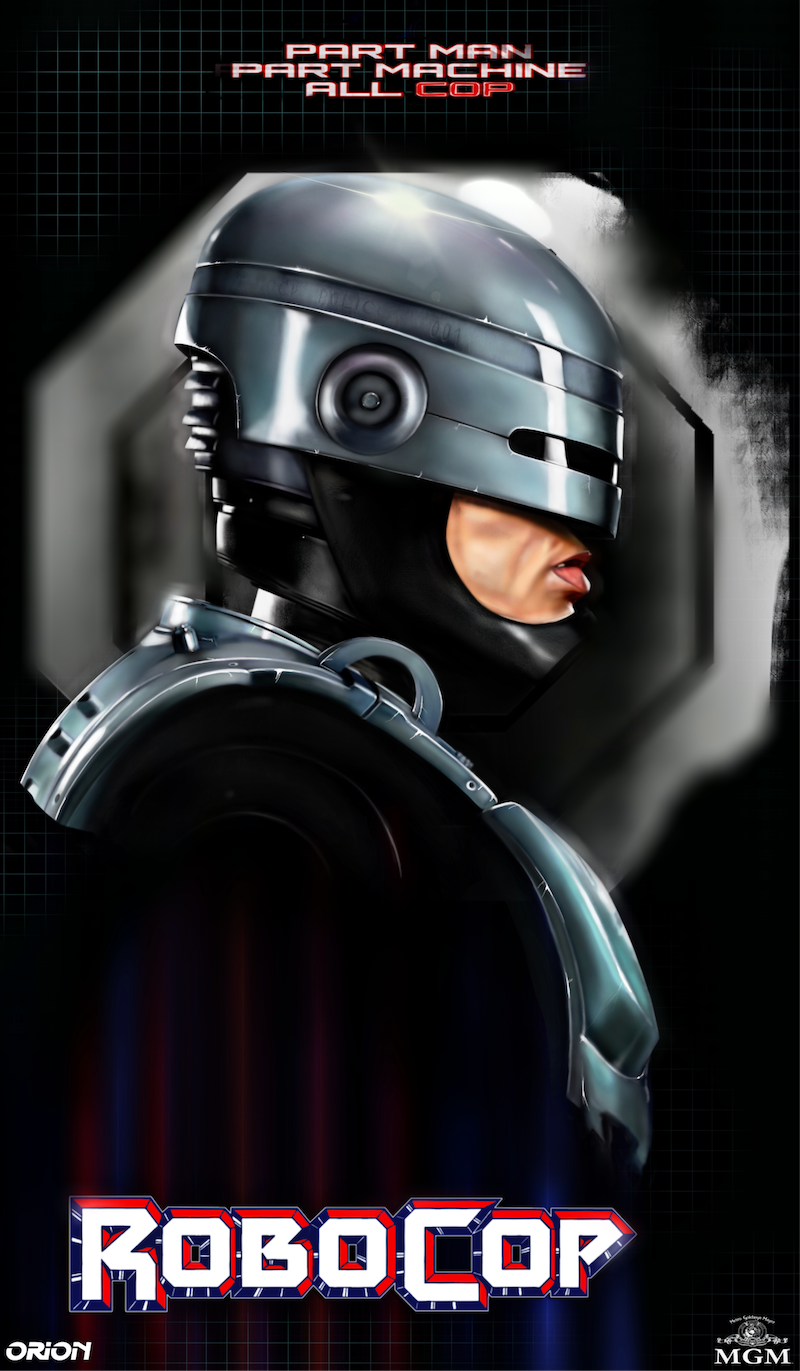 Until recently, I’d never seen RoboCop, Paul Verhoeven’s 1987 sci-fi classic about a viciously murdered cop who’s resurrected as a cyborg supercop. I was too young to see it when it first came out and didn’t get around to it when I was older, partly because I’d heard it was gruesomely violent. However, I learned it had passionate fans that included some very astute critics. Among them is Jeff Chen, former writer for ReelTalk Movie Reviews and a fellow alum of the dearly departed online critics’ group Cinemarati (through which I met both him and TFE’s very own Nathaniel), who ranks RoboCop as his favorite movie. As part of TFE’s 1987 retrospective, I finally saw RoboCop and invited Jeff to discuss my reactions as a first-time viewer and how the movie has remained in our cultural consciousness for over 30 years.
Until recently, I’d never seen RoboCop, Paul Verhoeven’s 1987 sci-fi classic about a viciously murdered cop who’s resurrected as a cyborg supercop. I was too young to see it when it first came out and didn’t get around to it when I was older, partly because I’d heard it was gruesomely violent. However, I learned it had passionate fans that included some very astute critics. Among them is Jeff Chen, former writer for ReelTalk Movie Reviews and a fellow alum of the dearly departed online critics’ group Cinemarati (through which I met both him and TFE’s very own Nathaniel), who ranks RoboCop as his favorite movie. As part of TFE’s 1987 retrospective, I finally saw RoboCop and invited Jeff to discuss my reactions as a first-time viewer and how the movie has remained in our cultural consciousness for over 30 years.
JEFF: RoboCop is indeed my favorite movie. A lot of that has to do with timing. I was already an avid movie watcher as a teenager, but I’d been mostly watching PG or (the new, at the time) PG-13 movies. I was 15 when I went to my best friend’s house and he put on a VHS copy of RoboCop. And I was traumatized and exhilarated...
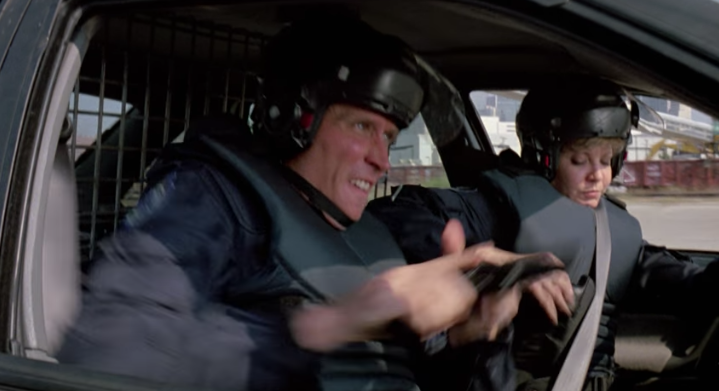
The movie has two very violent scenes early on and my impressionable self had never seen anything like that; they profoundly disturbed me. But as the movie continued, it was also emotional and cathartic. I’d never felt such lows and highs while watching a movie. I loved the story, but also that it showed me how much a movie could affect me.
I’m sure a number of other movies could have opened me up to that kind of experience, but RoboCop not only showed up at the right time, it played to my interests at the time (you can imagine how much the robot motif appealed to a kid who was very into the Transformers). Plus it’s genuinely good! Only later would I come to realize that the movie was beloved by many, not just me, and critically lauded, which made it stand out among the many sci-fi thrillers of the ’80s. Subsequent viewings have only made me appreciate it more and realize that it’s also a very funny satire. It still works the way it did for me long ago, but when I watch it today, I laugh a lot.
LYNN: For me, a first-time watcher in 2020, RoboCop was a trip – a brisk, brutal, and brutally funny trip – and a fascinating time capsule of the ’80s. I’m always amused by how much futuristic sci-fi movies end up being period pieces of the eras in which they were made, not just in the technology or the effects but the hairstyles (the hair is always the giveaway) and costuming, as well as whatever social or existential concerns are dominating the zeitgeist. The movies that endure usually do so because at least some of those concerns are enduring – here, humanity’s greed and self-destructiveness, the prospect of machines making humans obsolete, and what it really means to be “human.” You can see the heavy influence of the first Terminator film, and Blade Runner, too.
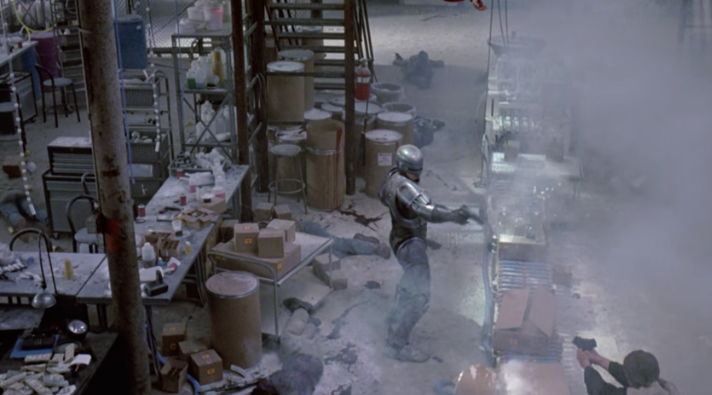
At the same time, it’s unmistakably a Verhoeven picture with its blend of extreme violence and goofy satire, where half the time you can’t tell whether you’re supposed to laugh or be disturbed, or both. To your point on its humor, I was prepared for the violence and the tone-juggling, but I wasn’t expecting the movie to be as hilarious as it is. Between the slyly anti-Reagan newscasts and ads (the Star Wars SDI gets quite the beating), the lumbering ED-209 utterly failing to negotiate a staircase, and the gross sight of a melting Paul McCrane crashing into a terrified Ray Wise after a run-in with a barrel of toxic waste, I found myself laughing out loud multiple times. Even RoboCop himself, despite his tragic back story, is funny, from the doomph-doomph of his walk to his monotone one-liners once he’s finished a job.
JEFF: It’s interesting that I never really think about how ’80s the movie looks, probably because I’ve seen it so much now that I’m just used to it. But there’s no denying it’s anything other than a solidly ’80s movie, despite having timeless themes like corporatization and the Frankenstein myth. Nothing dates a sci-fi movie more quickly than its vision of the future. Pre-tablet and internet movies have it particularly rough. I remember in one of the commentary tracks for RoboCop, the writers Ed Neumeier and Michael Miner expressed bemused disappointment at the best thing anyone could come up with for the RoboCop tracking device. Yes, that little screen with the orange lines and dots. At some point, especially for beloved movies, these things become a part of their charm.
LYNN: I actually wrote in my notes, “That tracker is pure ’80s.”
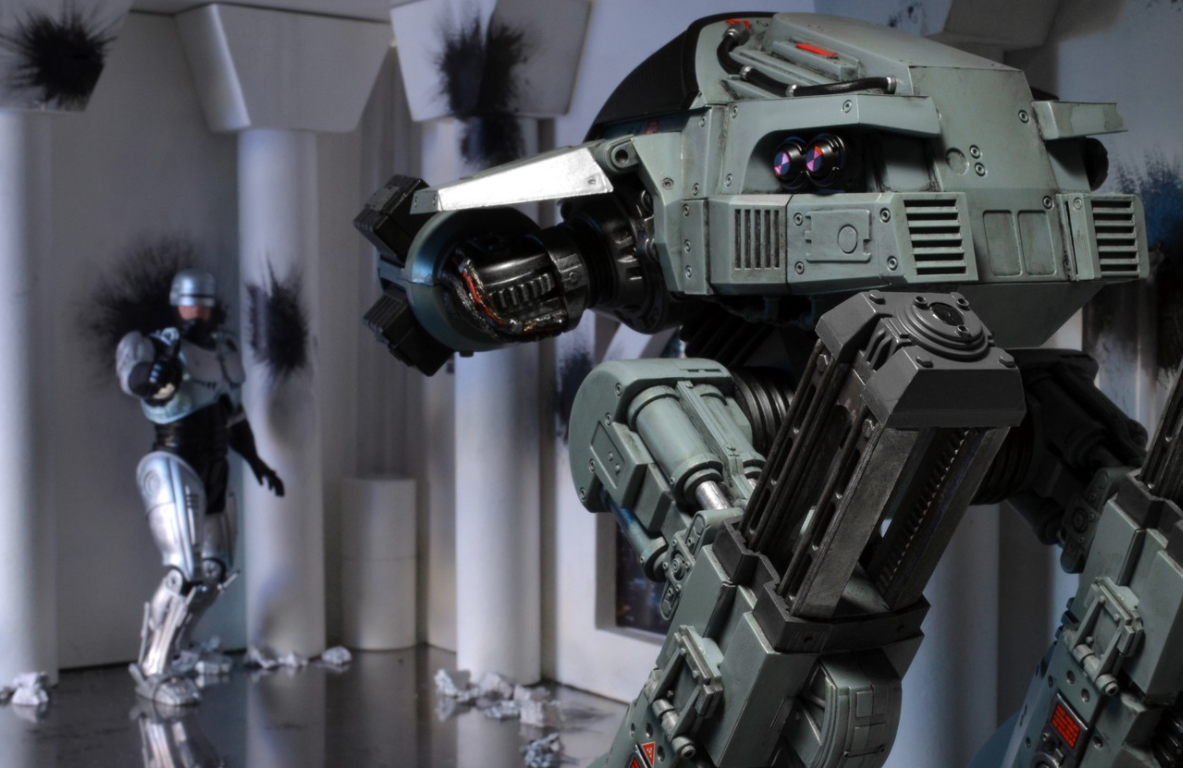
Speaking of timeless themes, I was vaguely expecting the movie to delve a little more than it did into RoboCop’s existential angst, à la Blade Runner. That it doesn’t may be due in part to the sparse characterization of Murphy [the protagonist]; we barely get to know him before he’s killed and transformed into RoboCop.
Peter Weller is great, especially in the scenes where Murphy’s memories are first triggered. And I like that we get to see his full face again for the third act of the movie, signifying the return of some of his humanity. But it did get me wondering what exactly is left of Murphy – his head? his brain? the part of the brain that retains his policing experience, with a few stray memories from his personal life? Obviously we’re not meant to dwell on how the cyborg mechanics work, but these questions do go to the core of who and what this character is. On the other hand, the movie’s also set up as a kind of Western, where we typically aren’t privy to the inner thoughts or the full back story of the lawman who comes to town to clean things up.
JEFF: I actually thought the background for Murphy was always about right, considering that my original response to this movie was how very bad I felt for what had happened to him and his family. Murphy having a kid who idolizes him and a wife who cares for him was effectively all I needed. When Murphy is killed, we know we lost a good man, and that’s enough to power the righteous revenge motif of the film (another ’80s theme). Half the reason the movie worked so well for me was its intensity; the other half was just this idea of a man who dies and then only remembers enough to know that he died and he can’t have back any of the good things that he’s lost. The only thing that’s truly returned to him is his identity, and that’s signified wonderfully by the famous last lines of the movie.
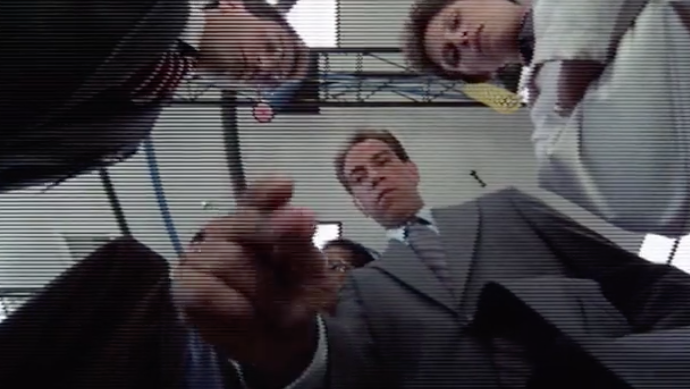 "lose the arm"
"lose the arm"
As for the mechanics, I’d grin and say that would be an exercise in futility. Our best clue is when Bob Morton [the corporate executive behind the RoboCop project] says, “I thought we agreed on total body prosthesis. Now, lose the arm.” So he’s mostly robot, with a human brain? The hilarious part is that he also has to be fed. It really makes no sense. But it honestly doesn’t matter to me as much as his look. If RoboCop didn’t look good, this movie would be dead in the water. However, the designers did a fabulous job, along with Peter Weller, whose movements are as iconic as the body’s design.
What did you think of the other characters in the movie?
LYNN: The only ones that really interested me were Morton (Miguel Ferrer) and Murphy’s partner Lewis (Nancy Allen). Although Lewis is clearly the most sympathetic supporting character, she isn’t really developed much, and I didn’t entirely buy that she would recognize RoboCop as Murphy. There are early hints of chemistry between them, but they only know each other for, what, a day before Murphy gets iced? Morton, on the other hand, is a surprisingly compelling figure for an ambitious prick. Maybe it’s Ferrer’s charisma, maybe it’s because Morton acts in opposition to the true villains of the movie despite being just as selfishly motivated as they are, but he’s fun to watch, and the movie becomes a little less fun once he exits.
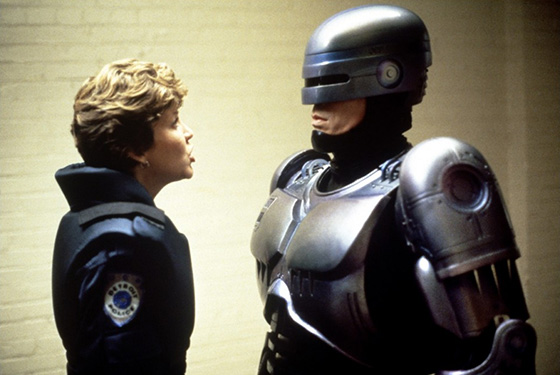 partners, even after death
partners, even after death
JEFF: Lewis may not have known Murphy for very long, but something tells me she hadn’t seen one of her partners so thoroughly slaughtered up close, which may have made their relationship more “personal” to her. Maybe they could have put more story behind her figuring out Murphy is RoboCop, but it’s pretty neat to make her recognition of his gun-twirling the trigger. I love Nancy Allen in this, and I also love that they made Lewis’s gender a non-issue. Verhoeven initially thought that she and RoboCop should fall in love, but was talked out of it by the writers and later concluded that they were absolutely right.
Character actors thrive in this movie. Ferrer is terrific as Morton, and he’s a great character in that he’s a scumbag you actually kind of care about at times. Ronny Cox played against type so well as the odious Dick Jones that Verhoeven would have him play the villain again in Total Recall. But my favorite is Kurtwood Smith as Clarence Boddicker, who for a long time was my pick for most evil screen villain, though he’s also very funny too. Decked out in glasses that Verhoeven made him wear as a reference to Heinrich Himmler, Smith gives Clarence more charisma than he has any right to have and makes a lively villainous contrast to RoboCop’s stiff demeanor.
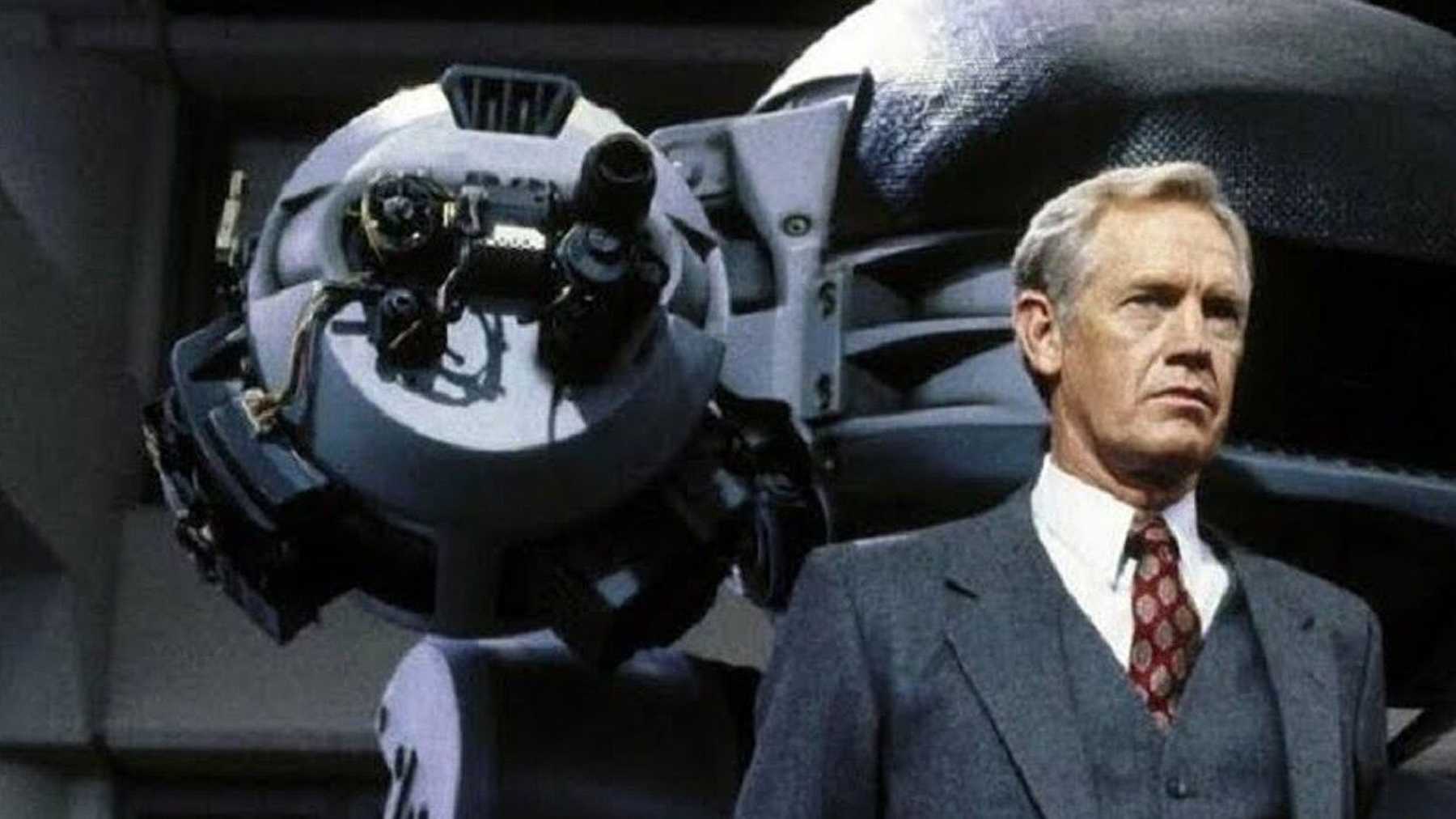 Ronny Cox, a great villain
Ronny Cox, a great villain
LYNN: Shifting gears slightly, I remember wondering before I saw the movie whether its sympathetic portrayal of an ultra-lethal supercop might feel out of place now, given the heightened scrutiny of use of force by cops and militarization of local police. But what struck me in watching it was how beleaguered and hapless the Detroit police seem to be, and that RoboCop actually displays comparative restraint when it comes to killing people. That didn’t stop some viewers from calling RoboCop a fascist movie, when, if anything, it’s the opposite. At the same time, it doesn’t surprise me that cops loved the movie; they’d probably love it even more now to the extent they feel under attack.
JEFF: If the film came out today, I think it would get shoehorned in as a superhero movie. I also think that the current cultural climate would have to be a factor. But then in thinking about the 2014 remake (tougher than it sounds, given how generally forgettable it was), I’d say it missed the opportunity to comment on perceptions of police, especially in matters relating to racial injustice. José Padilha tried to create a big picture story about the use of autonomous technology for security – think drone warfare – with a conservative television show host played by Samuel L. Jackson who argues that robot enforcers would keep people safer. This may sound interesting, but the movie was fairly flat. It was more thesis than story, a Tin Man with no heart – the exact opposite of the original RoboCop.
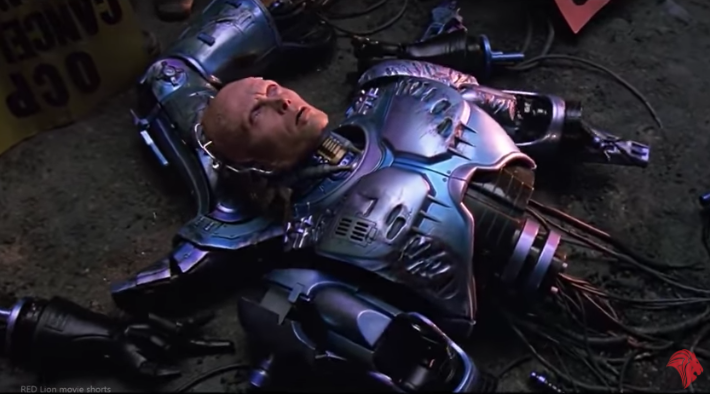 nothing to salvage from Robocop 2 (1990)
nothing to salvage from Robocop 2 (1990)
LYNN: As you may know, the original RoboCop writers (Neumaier and Miner) are working on another RoboCop movie that will essentially ignore all intervening RoboCop movies, including the sequels and the 2014 reboot. The most recent Terminator tried to do something similar, but it bombed. Do you think the RoboCop franchise will have better luck trying to reset for the 21st century? Or do you think the OG RoboCop will still be a movie people talk about in another 30 years?
JEFF: Personally, I never think decades-later sequels are a good idea, and most of the ones that ignore the in-between sequels have had mixed results. That said, if they’re going to do it, then ignoring the in-between RoboCops is absolutely the right way to go. RoboCop II (which does have its fans) and RoboCop III are both awful. There was a TV series that was fun and featured some interesting characters, but it was light and fairly silly. Anyway, it’ll be interesting to see how the original writers would continue the original movie, and if they can reflect our current times rather than the Reagan era. But I do think the original will be remembered as long as movies are around. It’s already surprised me in just how long it’s endured and how many people still admire it.
RoboCop is available via streaming on YouTube and Amazon Prime. (Note for the squeamish: the version on Amazon Prime is the even-more-violent Director’s Cut, though it’s not labeled as such.)